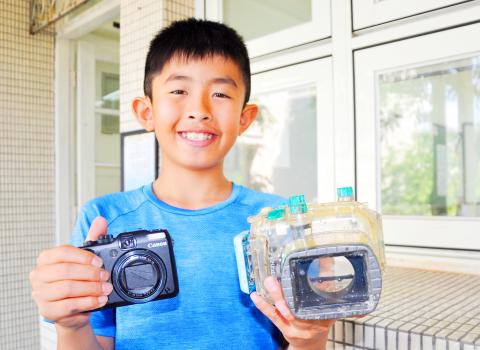A Japanese university student who is the owner of a camera that has been floating in the sea for more than two years and was recently found on a beach in Yilan County is to visit Taiwan in June to thank the finders in person.
Serina Tsubakihara posted a message in Japanese and English on her Facebook page late on Wednesday in response to the news that her camera had been found by a group of fifth-graders at Yueming Elementary School.
In her message, she explained that she went scuba diving with friends off Ishigaki Island in the summer of 2015, and while she was underwater she accidentally let go of her camera and it floated away.

Photo: CNA
While Tsubakihara decided to stop looking for her camera when she could not locate it at the scene, there were tens of thousands of netizens looking for her earlier this week.
Park Lee (李公元), the teacher of the students who found the camera during a routine beach cleanup, on Tuesday posted a Facebook message looking for the owner of the camera, which included some photographs from the camera.
Because the class inferred from the photographs that the owner was probably Japanese, Lee asked a friend to translate the message into Japanese to maximize the exposure.

Photo: Screen grab from Facebook
The post quickly went viral, being shared about 12,000 times on the social media platform, with Representative to Japan Frank Hsieh (謝長廷) even posting about the camera on his own Facebook page.
Tsubakihara, a student at Sophia University in Tokyo, said that she would travel to Taiwan in June to thank Lee and his students in person, and is counting down the days until her trip.
Tsubakihara said she is incredibly impressed that the camera, a black Canon PowerShot G12, seems to still be functional after all this time and is incredibly grateful for everyone’s help.

AGING: As of last month, people aged 65 or older accounted for 20.06 percent of the total population and the number of couples who got married fell by 18,685 from 2024 Taiwan has surpassed South Korea as the country least willing to have children, with an annual crude birthrate of 4.62 per 1,000 people, Ministry of the Interior data showed yesterday. The nation was previously ranked the second-lowest country in terms of total fertility rate, or the average number of children a woman has in her lifetime. However, South Korea’s fertility rate began to recover from 2023, with total fertility rate rising from 0.72 and estimated to reach 0.82 to 0.85 by last year, and the crude birthrate projected at 6.7 per 1,000 people. Japan’s crude birthrate was projected to fall below six,

Conflict with Taiwan could leave China with “massive economic disruption, catastrophic military losses, significant social unrest, and devastating sanctions,” a US think tank said in a report released on Monday. The German Marshall Fund released a report titled If China Attacks Taiwan: The Consequences for China of “Minor Conflict” and “Major War” Scenarios. The report details the “massive” economic, military, social and international costs to China in the event of a minor conflict or major war with Taiwan, estimating that the Chinese People’s Liberation Army (PLA) could sustain losses of more than half of its active-duty ground forces, including 100,000 troops. Understanding Chinese

US President Donald Trump in an interview with the New York Times published on Thursday said that “it’s up to” Chinese President Xi Jinping (習近平) what China does on Taiwan, but that he would be “very unhappy” with a change in the “status quo.” “He [Xi] considers it to be a part of China, and that’s up to him what he’s going to be doing, but I’ve expressed to him that I would be very unhappy if he did that, and I don’t think he’ll do that. I hope he doesn’t do that,” Trump said. Trump made the comments in the context

SELF-DEFENSE: Tokyo has accelerated its spending goal and its defense minister said the nation needs to discuss whether it should develop nuclear-powered submarines China is ramping up objections to what it sees as Japan’s desire to acquire nuclear weapons, despite Tokyo’s longstanding renunciation of such arms, deepening another fissure in the two neighbors’ increasingly tense ties. In what appears to be a concerted effort, China’s foreign and defense ministries issued statements on Thursday condemning alleged remilitarism efforts by Tokyo. The remarks came as two of the country’s top think tanks jointly issued a 29-page report framing actions by “right-wing forces” in Japan as posing a “serious threat” to world peace. While that report did not define “right-wing forces,” the Chinese Ministry of Foreign Affairs was